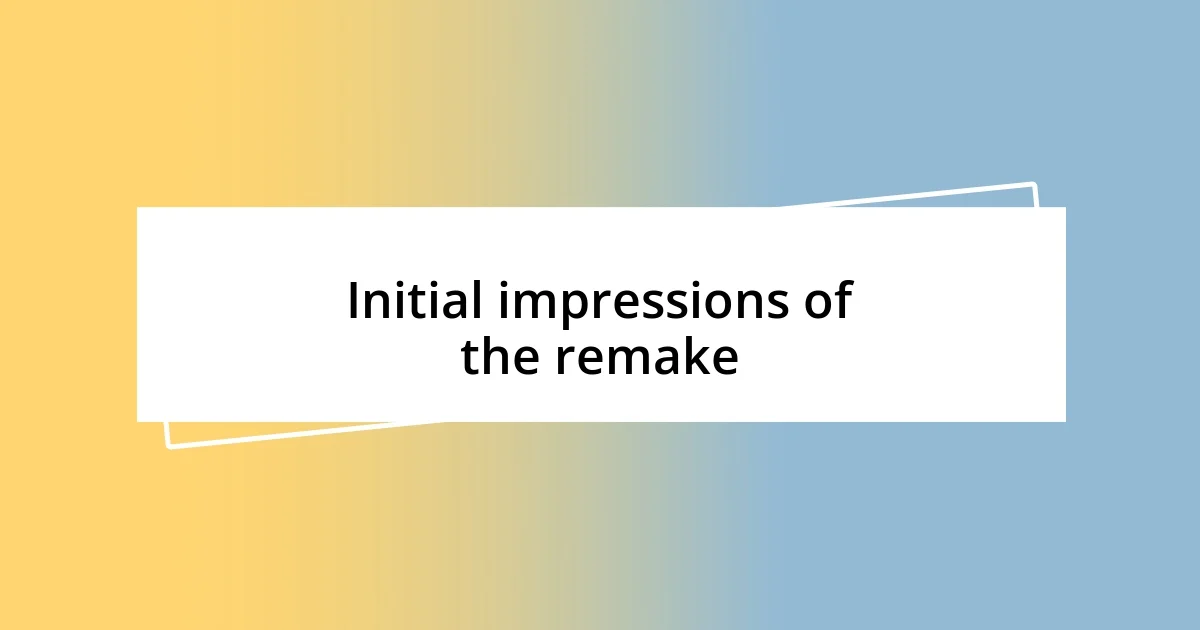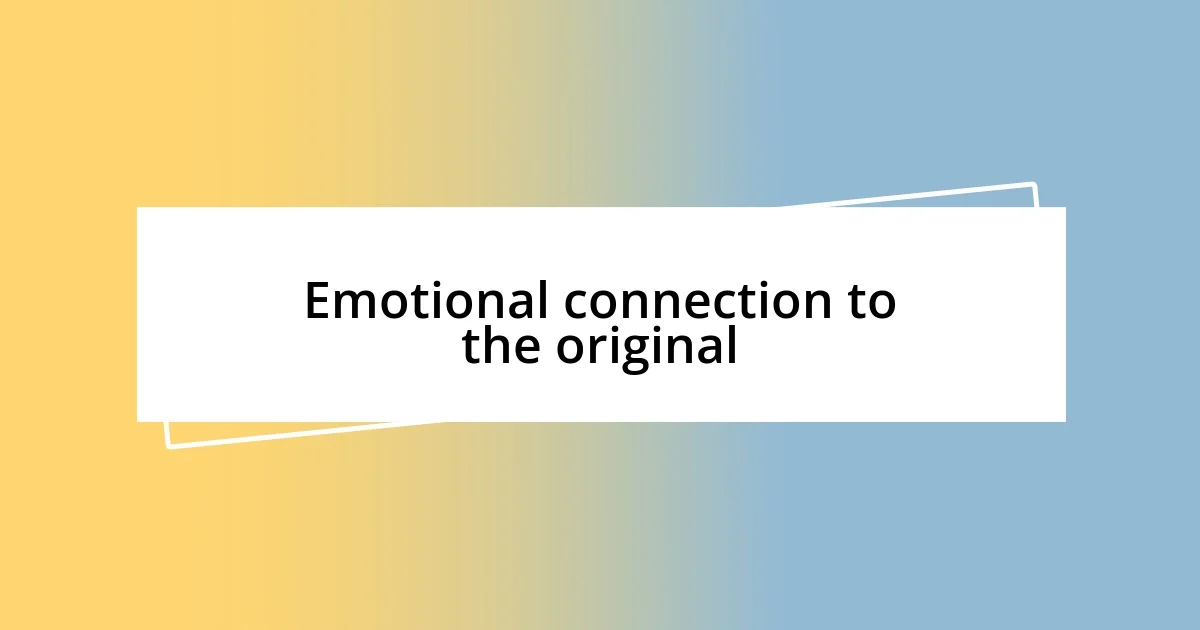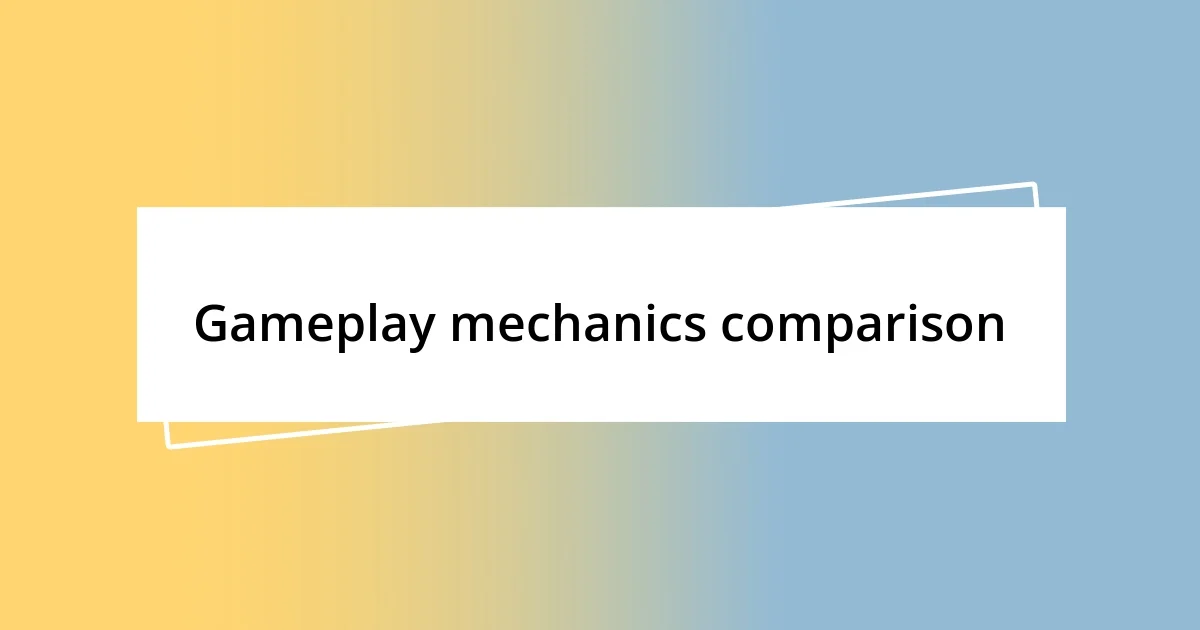Key takeaways:
- The remake evokes powerful nostalgia through enhanced visuals and audio, deepening the emotional connection to the original game.
- Gameplay mechanics have evolved, introducing fluid combat and adjustable difficulty, which enrich the overall gaming experience.
- New features and challenges engage players both emotionally and psychologically, transforming the gameplay into a personal and rewarding journey.

Initial impressions of the remake
As I first delved into the remake, I felt an overwhelming wave of nostalgia wash over me. The familiar soundtrack greeted me like an old friend, tugging at heartstrings I didn’t realize had been dormant. Who knew a few notes could transport me back in time and trigger a flurry of memories tied to the original?
The visual improvements instantly captured my attention—a beautiful blend of old and new. I found myself marveling at the stunning graphics that breathed life into the beloved characters and settings. Did anyone else feel a thrill witnessing the vibrant colors and intricate details that were once limited by hardware constraints? It was almost like stepping into a painting, making the experience more immersive than ever.
However, what truly struck me was the emotional depth added to certain scenes. The developers took risks that I wasn’t expecting—moments that felt more poignant and resonant. It made me wonder: Could this remake potentially reshape how we remember the original? That added layer of storytelling ignited not just excitement but also a bittersweet longing for the simplicity of the past.

Emotional connection to the original
When I think about the emotional connection to the original, I can almost picture myself curled up on the couch, controller in hand, losing myself in uncharted adventures. The characters felt like family to me, each dialogue delivering a jolt of familiarity that filled me with warmth. I remember vividly the laughter and tears shared with friends over epic battles, making those shared experiences stand out even more when revisiting the remake.
Witnessing my childhood heroes rendered in modern graphics brought a sweet nostalgia mixed with an undeniable sense of loss. Although they looked incredible, I couldn’t shake the feeling that something essential from the original had been altered. Have you ever felt that yearning when seeing beloved characters in a new light? It made me reflect on how time transforms our perception, both in gaming and in life.
Interestingly, the remake seems to have opened up a conversation with the past, inviting us to reconsider what we cherished about the original. The subtle changes in dialogue and plot nuances sparked thoughtful discussions as we reminisced. I found myself sharing stories with fellow gamers, reliving not only the gameplay but the emotional resonance that connected us all—an experience truly close to my heart.
| Aspect | Original Game | Remake |
|---|---|---|
| Nostalgia Factor | Strong emotional ties; childhood memories associated with gameplay | Modern visuals evoke reflections on past experiences |
| Character Connections | Felt like family, personal investment in their journeys | Familiar, yet new; evokes complex feelings about change |
| Storytelling Depth | Simple and straightforward narratives | Enhanced emotional layers; allows deeper engagement |

Gameplay mechanics comparison
The gameplay mechanics in the remake definitely caught my attention. The combat system felt more fluid and engaging, resembling the dynamic playstyles we’re accustomed to in modern games. I remember how, back in the day, my fingers would fumble in critical moments, leading to frustrating defeats. In the remake, however, the controls were intuitive, allowing me to execute combos effortlessly. It’s like rediscovering an old friend who’s now a skilled martial artist.
Here’s a direct comparison of some key gameplay mechanics:
-
Combat Style:
- Original Game: Mostly turn-based; strategic but slow-paced.
- Remake: Real-time combat adds urgency and excitement, enhancing player engagement.
-
Movement Mechanics:
- Original Game: Limited mobility; felt almost clunky, with strict pathways.
- Remake: Greater freedom of movement, allowing players to explore and navigate beautifully designed worlds.
-
Difficulty Levels:
- Original Game: A one-size-fits-all approach that sometimes tested players’ patience.
- Remake: Adjustable difficulty settings offer personalized challenges, catering to both veterans and newcomers.
Experiencing the gameplay mechanics felt like a reawakening of my gaming spirit, prompting me to think about how these changes shaped my overall experience. I found myself eagerly pushing through tougher encounters that previously might have stalled me. It’s exhilarating to see how these improvements not only elevate the gameplay but also reconnect me with the thrill of discovery that gaming always delivered.

Visual and audio enhancements
Visually, the enhancements in the remake took my breath away. I found myself captivated by vibrant colors and detailed landscapes that breathed life into every corner of the game world. It reminded me of those quiet afternoons when I’d pause to marvel at the graphics of older games, but the remake felt like stepping into a living painting. Have you ever experienced that moment when a game’s visuals completely consume you, making you forget the real world?
The audio improvements were equally striking. I remember the haunting melodies from the original that would linger in my mind long after I’d stopped playing, but the remake added layers of richness that enhanced my emotional journey. The sound effects were so immersive; it felt like I was right there on the battlefield, adrenaline pumping. Have you ever noticed how a well-placed sound can elevate a scene to a level of emotional depth you didn’t anticipate? It certainly brought a freshness to familiar memories and felt like hearing an old song reimagined with a modern twist.
As I played, I found it intriguing how both the visual and audio enhancements sparked new emotions. For instance, lighting changes during pivotal moments intensified the storytelling, making me feel each character’s turmoil in a way I hadn’t felt before. Each battle cry, each moment of silence, became magnified, forcing me to pause and absorb the weight of the narrative. This kind of experience is a reminder of how vital sensory elements are in shaping our engagement—don’t you think that such beautiful audio-visual synergy can make or break a gaming experience?

Nostalgia and its impact
Nostalgia has a uniquely powerful way of weaving itself into our gaming experiences. While playing the remake, I was bombarded with memories of late-night gaming marathons, battling pixels that were far less polished than today’s graphics. I found myself thinking, “Can a game truly evoke the same feelings I had as a kid?” Surprisingly, it did. The familiar music cues felt like old friends greeting me, reigniting emotions I thought had faded. It’s incredible how a single note can transport you back in time, isn’t it?
Reflecting on my journey through the remake, I noticed the emotional weight nostalgia brought to my gameplay. It added a layer of urgency to my actions; each victory felt earned, almost as if I were fighting for that younger version of myself. I remember a specific boss battle that mirrored a frustrating moment from my childhood. Back then, I’d thrown down my controller in defeat, but this time, the memories of my earlier struggles fueled my persistence. It became not just a game, but a chance for redemption—a way to reconcile my past with my present.
As I navigated through those pixelated memories, I wondered what makes nostalgia such an integral part of our gaming experiences. It’s like a double-edged sword, sharpening our senses while also making us long for the simplicity of the past. I’ve often thought, “Is this longing for past experiences what makes us appreciate the artistry of remakes?” With every turn in the remodeled world, it felt as if the developers were not just recreating a game, but sculpting a bridge between who I was then and who I am now. That intersection of past and present is where nostalgia truly thrives.

New features and challenges
One of the standout features in the remake was the addition of new gameplay mechanics that introduced fresh challenges. I vividly remember facing a puzzle that required critical thinking—something I wasn’t expecting in a game that leaned heavily on action. It almost felt like an engaging riddle, compelling me to pause and strategize. Have you ever been immersed in a game where a single challenge made you feel truly accomplished once you solved it? I certainly felt that rush, realizing the developers aimed to elevate our experience beyond mere nostalgia.
The enhanced character progression system also intrigued me tremendously. As I leveled up, I found myself making choices that altered my gameplay in ways I hadn’t anticipated. Those decisions created a sense of ownership over the character that was deeply satisfying. It brought to mind the many times I’ve struggled to choose the right upgrades in previous titles. Isn’t it fascinating how a simple choice can drastically shift the dynamics of the game? I felt like a curator of my own adventure, carving out a unique path that reflected my playstyle.
Additionally, the challenges presented in the remake weren’t just gameplay mechanics; they often mirrored emotional hurdles as well. For instance, during one particularly intense encounter, I felt my heart race, almost as if the stakes were as real as a life or death situation. This kind of emotional investment made the challenge beyond just beating an enemy; it blended a psychological struggle with the physical one. Have you ever come across a moment in gaming where you felt an emotional resonance that pushed you to your limits? That’s precisely what I experienced, and it made every victory feel monumental and worth celebrating.

Overall experience and reflections
Navigating the world of the remake was like re-entering a familiar yet evolved landscape. I found myself reflecting on how each detail, from the textures to the dialogue, influenced not only my gameplay but also my emotions. Have you ever played a game that simultaneously felt both new and familiar? For me, it struck a beautiful balance, where my nostalgia mingled seamlessly with the fresh design, creating an experience that was deeply satisfying.
As I progressed through the remake, I often caught myself grinning at unexpected callbacks that resonated with my fondest memories. One moment that I cherish involved revisiting an iconic location, now reimagined with stunning visuals. The air seemed charged with memories, and I could almost hear the laughter of friends who had once gathered to embark on epic quests alongside me. This blend of past and present enriched my experience, pushing me to appreciate how far gaming has come while still honoring its roots.
Reflecting on the overall experience made me think about how remakes can serve as emotional canvases. It’s as if they invite us to paint our own stories over a shared history. Did I approach the challenges differently this time, influenced by my past experiences? Absolutely. I tackled puzzles with newfound wisdom, and when I faced adversaries, I felt the weight of all those late-night struggles surging through me. This journey through nostalgia, enhanced gameplay, and emotional depth made the remake not just a nostalgic trip, but a transformative experience that I’ll treasure for years to come.












